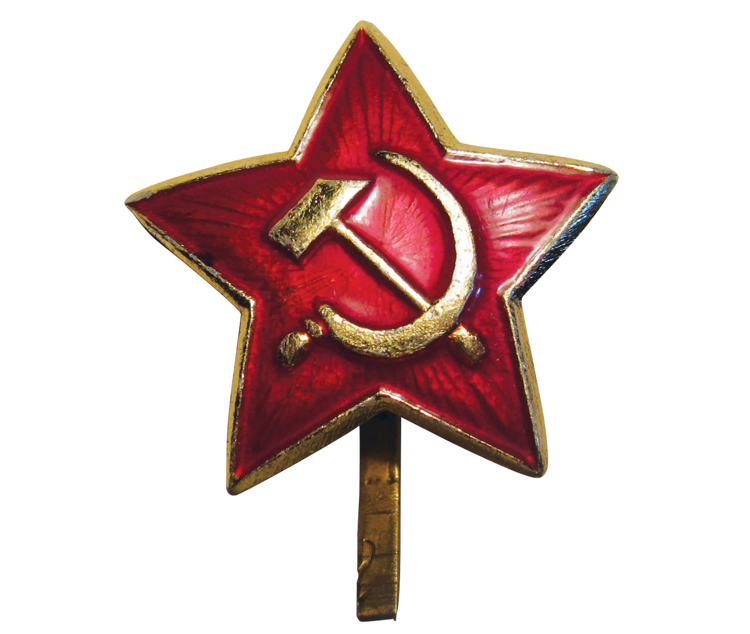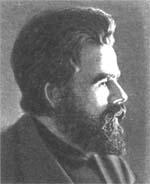 IRON SILENCE by Lyashko, Nikolai
(1924)
A story dealing with the painful scab of stagnation that has come over a factory...a factory where
workers once suffered under the whip...a factory which crucified workers on its spinning metal gears in
ghastly industrial accidents...a fatory which gave workers shelter as they studied revolutionary texts and
fought battles with strike-breaking Cossacks. Now the factory lies abandoned and crumbling, dismantled piece by piece
by pilferers and looters. Workers long to take up the hammer again, but Party officials get nothing done.
IRON SILENCE by Lyashko, Nikolai
(1924)
A story dealing with the painful scab of stagnation that has come over a factory...a factory where
workers once suffered under the whip...a factory which crucified workers on its spinning metal gears in
ghastly industrial accidents...a fatory which gave workers shelter as they studied revolutionary texts and
fought battles with strike-breaking Cossacks. Now the factory lies abandoned and crumbling, dismantled piece by piece
by pilferers and looters. Workers long to take up the hammer again, but Party officials get nothing done.(Click here to read entire story text.)
 Marcelle by Gerasimov, Mikhail
(1920)
A young female French Communist secretly boards a French warship to agitate among the sailors, who are
hugry for word on the revolution in Russia. The sea itself gets involved in the revolutionary struggle,
heaving and seething in an attempt to cast off the warships and their weapons of death. Gerasimov was a member
of the "Smithy" proletarian writers group.
(Click here to read entire story text.)
Marcelle by Gerasimov, Mikhail
(1920)
A young female French Communist secretly boards a French warship to agitate among the sailors, who are
hugry for word on the revolution in Russia. The sea itself gets involved in the revolutionary struggle,
heaving and seething in an attempt to cast off the warships and their weapons of death. Gerasimov was a member
of the "Smithy" proletarian writers group.
(Click here to read entire story text.)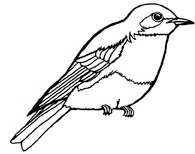 In The Country by Grossman, Vasily (1960).
The story of terror and a man alone. Snow, an axe, a bluebird, and blood combine to create
an allegorical mystery, with the reader left to determine the meaning. Is the terror real, or is it
just paranoia?
In The Country by Grossman, Vasily (1960).
The story of terror and a man alone. Snow, an axe, a bluebird, and blood combine to create
an allegorical mystery, with the reader left to determine the meaning. Is the terror real, or is it
just paranoia? (Click here to read entire story.)
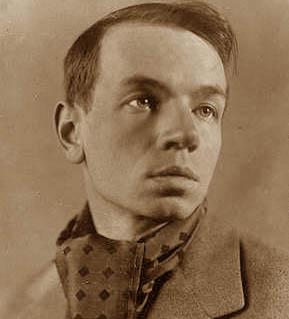 I am Goya by
Voznesensky, Andrei.
Bilingual, Russian-English, version of one of Voznesensky's most famous poems. "I am Goya! My eyes plucked to
craters....
I am Goya by
Voznesensky, Andrei.
Bilingual, Russian-English, version of one of Voznesensky's most famous poems. "I am Goya! My eyes plucked to
craters....(Click here for full version of this bilingual text)
 Gviu, Shooya, Glav-boom! by
Pilnyak, Boris
(1922). "Russia is a mirage...a delusion...all wood demons, witches, and water sprites." Thus, in part, an old priest
attempts to explain the Revolution, and indeed the whole of Russian history in this excerpt from Boris Pilnyak's
powerful 1922 novel The Naked Year. Primitive, superstitious, and anarchic, the Russian peasants, by fleeing government, have created a new government,
bringing with them the sounds of demons drumming and witches waggling their breasts: Kolkhoz, Gviu, Shooya,
Glav-boom!
Gviu, Shooya, Glav-boom! by
Pilnyak, Boris
(1922). "Russia is a mirage...a delusion...all wood demons, witches, and water sprites." Thus, in part, an old priest
attempts to explain the Revolution, and indeed the whole of Russian history in this excerpt from Boris Pilnyak's
powerful 1922 novel The Naked Year. Primitive, superstitious, and anarchic, the Russian peasants, by fleeing government, have created a new government,
bringing with them the sounds of demons drumming and witches waggling their breasts: Kolkhoz, Gviu, Shooya,
Glav-boom!(Full text of this extract in English here)
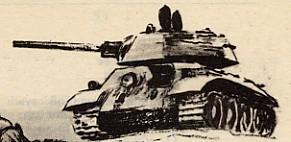 In The War by
Grossman, Vasily
(1942). A positive, inspirational story of a loner tank-driver, who, during the course of the war, slowly comes
to develop bonds of friendship with his fellow tank crew members. When he is wounded and sent to the rear, he comes to
recognize the strength of this comradeship and he realizes, for the first time in his life, the power and value of
love.
(Full text in English here)
In The War by
Grossman, Vasily
(1942). A positive, inspirational story of a loner tank-driver, who, during the course of the war, slowly comes
to develop bonds of friendship with his fellow tank crew members. When he is wounded and sent to the rear, he comes to
recognize the strength of this comradeship and he realizes, for the first time in his life, the power and value of
love.
(Full text in English here)  Three Kopecks by
Bulgakov, Mikhail
The story of the little man, a railroad
employee, coming up against bureaucracy and the taxman. And--reader beware: this story contains nudity.
(Complete Text in English)
Three Kopecks by
Bulgakov, Mikhail
The story of the little man, a railroad
employee, coming up against bureaucracy and the taxman. And--reader beware: this story contains nudity.
(Complete Text in English)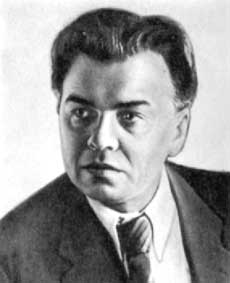 The Tramp by
Leonov, Leonid
(1928). Story of a peasant, who, as Soviet power wins sway in the villages, feels betrayed by his wife. He snaps
mentally and permanantly abandons the world. Soviet authorities attempt to track him down, but like a wild bear he
returns alone to the woods.
(Full text in English here)
The Tramp by
Leonov, Leonid
(1928). Story of a peasant, who, as Soviet power wins sway in the villages, feels betrayed by his wife. He snaps
mentally and permanantly abandons the world. Soviet authorities attempt to track him down, but like a wild bear he
returns alone to the woods.
(Full text in English here) The Alcoholic's Brother by Panteleev, Aleksei (1960). Short story illustrating that you can't believe every denunciation that you hear. (Complete text in English)
 Ivan Ivanych Samovar by
Kharms, Daniil
(1928).A friendly samovar dispenses tea. Late risers, however, are in for a surprise.
Ivan Ivanych Samovar by
Kharms, Daniil
(1928).A friendly samovar dispenses tea. Late risers, however, are in for a surprise.(Full text in English here)
Blood Knot by Dumbadze, Nodar (c.1984). A Georgian tale of family.
(Full text in English here)
The Coward by Panteleev, Aleksei (1941). Very short story showing that cowardice equals greed and collectivism equals courage. (Complete text in English)
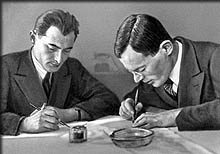 "CONVERSATIONS AT TEA" by Ilya Ilf &
Evgeny Petrov
(1934). Soviet funny men Ilya Ilf and Evgeny Petrov, besides creating Ostap Bender (hero of the classic comic novels
The Twelve Chairs and The Golden Calf), wrote numerous sketches, stories, plays, etc. One such story,
Conversations at Tea, touches on a generation gap between an Old Bolshevik and his 12-year-old son,
arising from the excessively "revolutionary" education the boy is receiving at school. Fortunately,
the Central Committee steps in just in time withi a back-to-basics decree, thereby saving a hapless 8-year-old
from being worked over politically. The story also takes a swipe at politically correct but inane poetry
as was often celebrated by super-orthodox literay groups such as RAAP.
"CONVERSATIONS AT TEA" by Ilya Ilf &
Evgeny Petrov
(1934). Soviet funny men Ilya Ilf and Evgeny Petrov, besides creating Ostap Bender (hero of the classic comic novels
The Twelve Chairs and The Golden Calf), wrote numerous sketches, stories, plays, etc. One such story,
Conversations at Tea, touches on a generation gap between an Old Bolshevik and his 12-year-old son,
arising from the excessively "revolutionary" education the boy is receiving at school. Fortunately,
the Central Committee steps in just in time withi a back-to-basics decree, thereby saving a hapless 8-year-old
from being worked over politically. The story also takes a swipe at politically correct but inane poetry
as was often celebrated by super-orthodox literay groups such as RAAP.(Click here to read "Conversations at Tea" by Ilf & Petrov.)
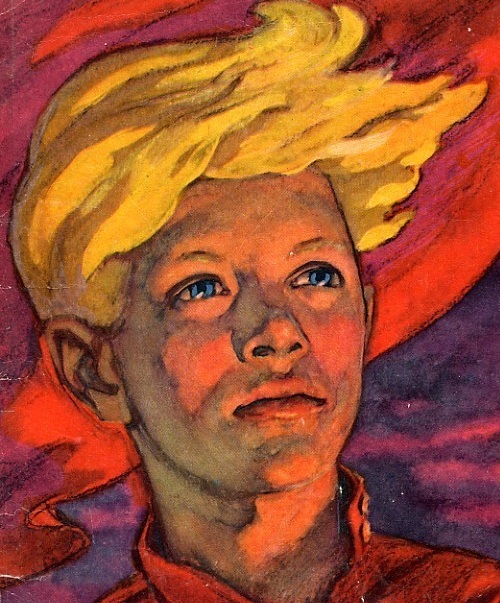 "TALE OF THE MILITARY SECRET" by
Arkady Gaidar
(1935).
The peaceful Soviet motherland is subjected to a perfidious sneak attack by bourgeois forces. As the Soviet
fathers and older brothers are killed, little children have to join the battle. Once such child is the Malchik-Kibalchish.
He is captured and tortured, but remains true to his word and does not reveal the great military secret of what
makes the motherland and the workers of the world so strong. His bravery gives the Red Army the time it needs to ride to the rescue.
"TALE OF THE MILITARY SECRET" by
Arkady Gaidar
(1935).
The peaceful Soviet motherland is subjected to a perfidious sneak attack by bourgeois forces. As the Soviet
fathers and older brothers are killed, little children have to join the battle. Once such child is the Malchik-Kibalchish.
He is captured and tortured, but remains true to his word and does not reveal the great military secret of what
makes the motherland and the workers of the world so strong. His bravery gives the Red Army the time it needs to ride to the rescue. (Complete text in both English and Russian))
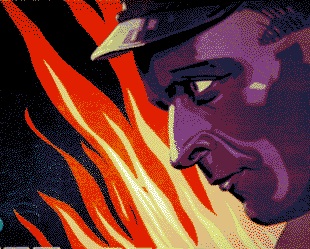 THE TANKER DERBENT by Krymov, Yuri
(1938). The undisciplined and uncaring crew of an oil tanker gets swept up in the excitement of the
Stakhanovite movement and completely transform themselves. A daring rescue on the high seas is featured, and the
sanctity of marriage is upheld.
THE TANKER DERBENT by Krymov, Yuri
(1938). The undisciplined and uncaring crew of an oil tanker gets swept up in the excitement of the
Stakhanovite movement and completely transform themselves. A daring rescue on the high seas is featured, and the
sanctity of marriage is upheld.
(Full summary here)
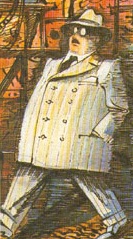 ENVY by Olesha, Yuri
(1927). A successful Soviet food industry wizard gives shelter to an aimless drifter. The drifter
comes to envy his host and, with the aid of his host's brother, plots a "conspiracy of feelings" against the new era.
The plotters plan on using an "Ophelia machine" to annihilate their enemies.
ENVY by Olesha, Yuri
(1927). A successful Soviet food industry wizard gives shelter to an aimless drifter. The drifter
comes to envy his host and, with the aid of his host's brother, plots a "conspiracy of feelings" against the new era.
The plotters plan on using an "Ophelia machine" to annihilate their enemies.(Full summary here)
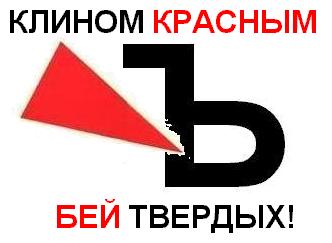 THE FOUNDATION PIT by Platonov, Andrei
(1930).A worker, fired for thinking too much on the job, sets off on a nightmarish, almost surreal quest
for truth and meaning. He ends up on a crew digging the foundation pit for a gigantic proletarian edifice. Some
workers are then sent to the countryside to assist in the collectivization campaign. Workers are murdered; peasants
slaughter and gorge themselves on their livestock to keep it from being collectivized; kulak and sub-kulak forces
are liquidated; a proletarian bear, adept at sniffing out kulaks, keeps everyone awake with his noisy hammering; and the
fate of the tvordii znak (hard sign) is in doubt.
THE FOUNDATION PIT by Platonov, Andrei
(1930).A worker, fired for thinking too much on the job, sets off on a nightmarish, almost surreal quest
for truth and meaning. He ends up on a crew digging the foundation pit for a gigantic proletarian edifice. Some
workers are then sent to the countryside to assist in the collectivization campaign. Workers are murdered; peasants
slaughter and gorge themselves on their livestock to keep it from being collectivized; kulak and sub-kulak forces
are liquidated; a proletarian bear, adept at sniffing out kulaks, keeps everyone awake with his noisy hammering; and the
fate of the tvordii znak (hard sign) is in doubt.
(Full summary here)
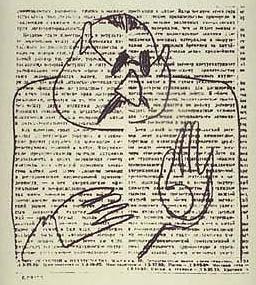 GUESTS by Zorin, Leonid
(1954). Intergenerational conflict centered around an honest Old Bolshevik and his adult son, who
has become an arrogant, corrupt, materialistic bigwig, interested only in his position and comfort. The bigwig
engages in an arbitrary injustice and plots to ruin the career of an innocent man. The Old Bolshevik uncovers
the plot and banishes his son. Even the bigwig's own son--a representative of the younger generation--promises to wage
tireless war on his father and all like him. Published in Feb 1954, it is one of the first Thaw-era works.
GUESTS by Zorin, Leonid
(1954). Intergenerational conflict centered around an honest Old Bolshevik and his adult son, who
has become an arrogant, corrupt, materialistic bigwig, interested only in his position and comfort. The bigwig
engages in an arbitrary injustice and plots to ruin the career of an innocent man. The Old Bolshevik uncovers
the plot and banishes his son. Even the bigwig's own son--a representative of the younger generation--promises to wage
tireless war on his father and all like him. Published in Feb 1954, it is one of the first Thaw-era works.
(Full summary here)
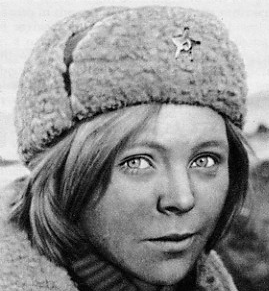 HOT SNOW by Bondarev, Yuri
(1969). An artillery battery at Stalingrad fights against cold, hunger, and encirclement. Some soldiers are heros,
others come unglued; all are in some way flawed. "Friendly fire" takes a toll. Counterintelligence unjustly
suspects a competent general of harboring traitorous intentions. Suggestions are made that Stalin is less than
perfect. And through it all, the men fight among themselves to win the love of the alluring medical
instructor Zoya!
HOT SNOW by Bondarev, Yuri
(1969). An artillery battery at Stalingrad fights against cold, hunger, and encirclement. Some soldiers are heros,
others come unglued; all are in some way flawed. "Friendly fire" takes a toll. Counterintelligence unjustly
suspects a competent general of harboring traitorous intentions. Suggestions are made that Stalin is less than
perfect. And through it all, the men fight among themselves to win the love of the alluring medical
instructor Zoya!(Full summary here)
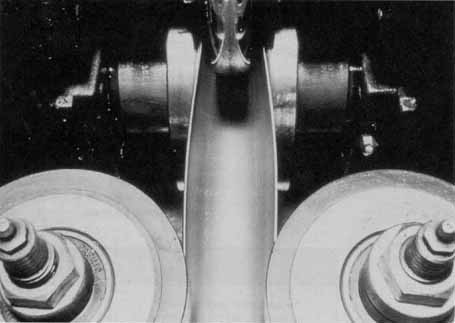 FROM THE POINT OF VIEW OF ETERNITY by Zagrebelny, Pavlo
(1971).
Given the task of creating special pipes for a secret project, a young Ukrainian worker and his team battle a
stagnation-bent careerist and defy official orders to develop a fundamentally new pipe-rolling technique.
The breakthrough comes following a literal and figurative marriage of brains and brawn.
FROM THE POINT OF VIEW OF ETERNITY by Zagrebelny, Pavlo
(1971).
Given the task of creating special pipes for a secret project, a young Ukrainian worker and his team battle a
stagnation-bent careerist and defy official orders to develop a fundamentally new pipe-rolling technique.
The breakthrough comes following a literal and figurative marriage of brains and brawn.
(Full summary here)
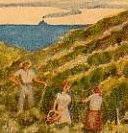 HAPPINESS by Pavlenko, Pyotr
(1947). A war veteran comes to the devastated Crimea, hoping for a quiet and peaceful life.
Instead, he finds happiness working to rebuild the smashed economy. He also plays a part in the Yalta Conference.
Churchill is a fat, drunken pig. U.S. Army officers are more interested in selling soap than in defeating the enemy. Stalin Prize winner, 1947.
HAPPINESS by Pavlenko, Pyotr
(1947). A war veteran comes to the devastated Crimea, hoping for a quiet and peaceful life.
Instead, he finds happiness working to rebuild the smashed economy. He also plays a part in the Yalta Conference.
Churchill is a fat, drunken pig. U.S. Army officers are more interested in selling soap than in defeating the enemy. Stalin Prize winner, 1947.
(Full summary here)
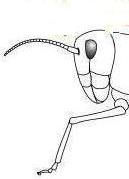 LOCUSTS by Budantsev, Sergei
(1927). A remote area of southern Azerbaijan is threatened with an
LOCUSTS by Budantsev, Sergei
(1927). A remote area of southern Azerbaijan is threatened with an (Full summary here)
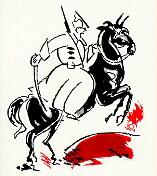 WHITE GUARD by Bulgakov, Mikhail
(1924). A family of White Guardists and their friends are forced to accept defeat as their side loses to Petlyura's
Ukrainian nationalists in Kiev in December 1918.
WHITE GUARD by Bulgakov, Mikhail
(1924). A family of White Guardists and their friends are forced to accept defeat as their side loses to Petlyura's
Ukrainian nationalists in Kiev in December 1918.
(Full summary here)
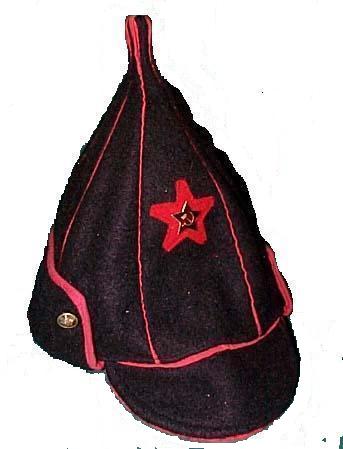 THE ROUT by Fadeev, Aleksandr
(1927). A detachment of Red Army partisans in the Far East flee from pursuing Cossacks and Japanese interventionist
forces. Jealosy and lust threaten comradely relations. A true leader emerges, and the harmful effect of the
Maximalist deviation is made apparant.
THE ROUT by Fadeev, Aleksandr
(1927). A detachment of Red Army partisans in the Far East flee from pursuing Cossacks and Japanese interventionist
forces. Jealosy and lust threaten comradely relations. A true leader emerges, and the harmful effect of the
Maximalist deviation is made apparant.
(Full summary here)
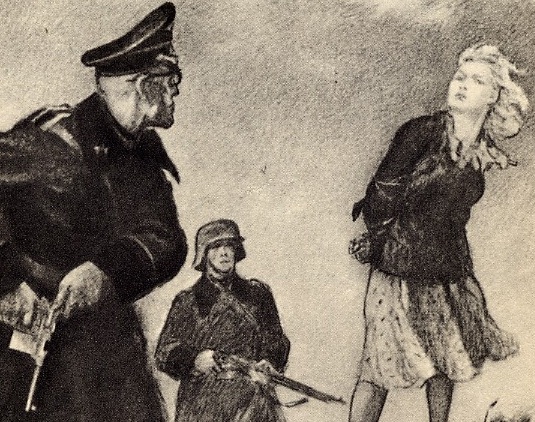 YOUNG GUARD by Fadeev, Aleksandr
(1947). In Nazi-occupied Ukraine, a group of teenagers forms a secret underground organization. They engage in
sabotage, arson and various forms of wrecking. They engineer a prison break and murder a filthy collaborator.
The Nazis finally catch them just weeks before liberation by Soviet troops. They are brutally tortured and murdered.
Based on real people and real events. Winner of the Stalin Prize.
YOUNG GUARD by Fadeev, Aleksandr
(1947). In Nazi-occupied Ukraine, a group of teenagers forms a secret underground organization. They engage in
sabotage, arson and various forms of wrecking. They engineer a prison break and murder a filthy collaborator.
The Nazis finally catch them just weeks before liberation by Soviet troops. They are brutally tortured and murdered.
Based on real people and real events. Winner of the Stalin Prize.
(Full summary here)
 NOT BY BREAD ALONE by Dudintsev, Vladimir
(1956). An inventor named Lopatkin struggles against entrenched bureaucracy and self-servers in an attempt to help the Soviet
pipe industry. He wins his personal battle, but the "invisible empire" of the bureaucracy remains intact and Lopatkin
knows that a long struggle still lies ahead.
NOT BY BREAD ALONE by Dudintsev, Vladimir
(1956). An inventor named Lopatkin struggles against entrenched bureaucracy and self-servers in an attempt to help the Soviet
pipe industry. He wins his personal battle, but the "invisible empire" of the bureaucracy remains intact and Lopatkin
knows that a long struggle still lies ahead.(Full summary here)
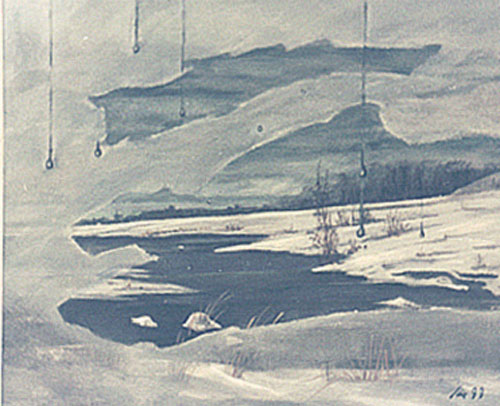 THE THAW by Ehrenburg, Ilya
(1954). The novel which gave its name to an entire era of Soviet history, consisting mainly of interior monologues of a
wide range of characters who are living inner personal lives at odds with their outer, public lives. Others struggle to
keep love out of their souls because it conflicts with their duties to the factory and to the Party. A talented
artist squanders his talent for the sake of glory and material success. But as winter passes and the
spring thaw comes, a change is beginning--loves and childlike exuberances are blossoming out into the open.
THE THAW by Ehrenburg, Ilya
(1954). The novel which gave its name to an entire era of Soviet history, consisting mainly of interior monologues of a
wide range of characters who are living inner personal lives at odds with their outer, public lives. Others struggle to
keep love out of their souls because it conflicts with their duties to the factory and to the Party. A talented
artist squanders his talent for the sake of glory and material success. But as winter passes and the
spring thaw comes, a change is beginning--loves and childlike exuberances are blossoming out into the open.
(Full summary here)
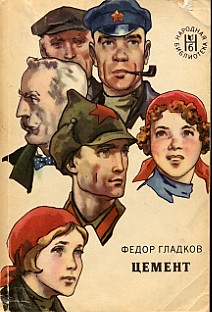 CEMENT by Gladkov, Fyodor
(1924). True Communists fight White Guards, bandits, lust and corruption as they struggle to bring a cement factory and the
Soviet economy back to life in post-Civil War days. Bourgeois engineers are tolerated, family relations are redefined and doubts raised about the wisdom
of Lenin's NEP (New Economic Policy).
CEMENT by Gladkov, Fyodor
(1924). True Communists fight White Guards, bandits, lust and corruption as they struggle to bring a cement factory and the
Soviet economy back to life in post-Civil War days. Bourgeois engineers are tolerated, family relations are redefined and doubts raised about the wisdom
of Lenin's NEP (New Economic Policy).
(Full summary here)
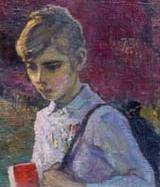 I WANT TO GO HOME by Mikhalkov, Sergei
(1948). In post-war Germany, the evil, murdering British keep displaced Soviet children captive, planning to turn
them into wage slaves and spies. Honest Germans, driven into poverty and despair by the bullying, land-grabbing,
greedy Americans, flee to freedom in the Soviet sector.
I WANT TO GO HOME by Mikhalkov, Sergei
(1948). In post-war Germany, the evil, murdering British keep displaced Soviet children captive, planning to turn
them into wage slaves and spies. Honest Germans, driven into poverty and despair by the bullying, land-grabbing,
greedy Americans, flee to freedom in the Soviet sector.
(Full summary here)
TWO DEATHS by Serafimovich, Aleksandr (1926). Street fighting rages on in Moscow. A young woman volunteers to spy on the Whites and has to pay the ultimate price.
(Full summary here)
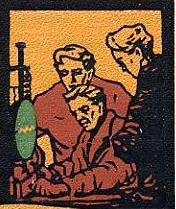 THOSE WHO SEEK by
Granin, Daniil
(1955). A scientist with a new idea, struggles to invent a device which will be of great benefit to the Soviet
electrical industry. Bureaucrats and established scientists at first try to steal the invention. When this
fails, feeling their position and privilege threatened, they begin falsifying their own data and whip up
a 1930s-style slander campaign against the young scientist.
They attempt to manipulate Party meetings and stifle open discussion in order to advance
their own careers. However, the falsity is eventually revealed, the rank-and-file demand the truth, and the
neer-do-wells receive their comeuppance. In another Thaw-era touch, unconventional love is rehabilitated,
i.e., the young scientist has an adulterous relationship and lives to tell about it.
THOSE WHO SEEK by
Granin, Daniil
(1955). A scientist with a new idea, struggles to invent a device which will be of great benefit to the Soviet
electrical industry. Bureaucrats and established scientists at first try to steal the invention. When this
fails, feeling their position and privilege threatened, they begin falsifying their own data and whip up
a 1930s-style slander campaign against the young scientist.
They attempt to manipulate Party meetings and stifle open discussion in order to advance
their own careers. However, the falsity is eventually revealed, the rank-and-file demand the truth, and the
neer-do-wells receive their comeuppance. In another Thaw-era touch, unconventional love is rehabilitated,
i.e., the young scientist has an adulterous relationship and lives to tell about it.
(Full summary here)
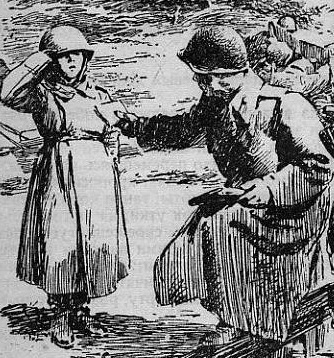 SON OF THE REGIMENT by
Kataev, Valentin
(1945).An orphan boy is picked up by a Soviet front-line artillery unit. He becomes one of them, going on a secret
mission behind German lines and taking part in a fierce and bloody battle. Stalin Prize
winner, 1946.
SON OF THE REGIMENT by
Kataev, Valentin
(1945).An orphan boy is picked up by a Soviet front-line artillery unit. He becomes one of them, going on a secret
mission behind German lines and taking part in a fierce and bloody battle. Stalin Prize
winner, 1946.
(Full summary here)
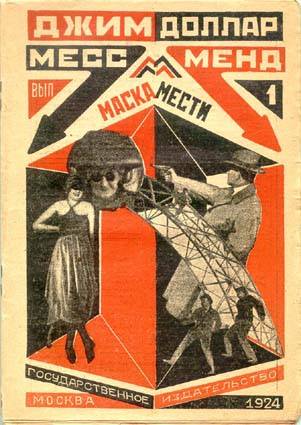 MESS MEND, OR A YANKEE IN PETROGRAD by
Shaginyan, Marietta
(1923 - 1925). Amusing spy thriller, comedy, and science fiction novel all rolled into one.
Western capitalists and members of the deposed nobility plot to assassinate Lenin and the entire Soviet government.
But they are foiled by a secret American workers organization, the Soviet government, and nature itself, which
afflicts
the deposed princes, capitalists, etc., with a bizarre degenerative disease, literally turning them into beasts.
MESS MEND, OR A YANKEE IN PETROGRAD by
Shaginyan, Marietta
(1923 - 1925). Amusing spy thriller, comedy, and science fiction novel all rolled into one.
Western capitalists and members of the deposed nobility plot to assassinate Lenin and the entire Soviet government.
But they are foiled by a secret American workers organization, the Soviet government, and nature itself, which
afflicts
the deposed princes, capitalists, etc., with a bizarre degenerative disease, literally turning them into beasts.
(Full summary here)
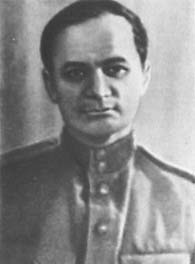 "He stopped a bullet with his mind."
"He stopped a bullet with his mind." THE SEVENTH MAN by Platonov, Andrei To save on ammunition, the Nazis try executing seven prisoners with a single bullet. One partisan miraculously survives the ordeal and escapes. However, driven to despair by the loss of his family, he returns to the same prison camp and again is the seventh man in the execution line. He finally achieves the death he so greatly desires. An eighth man, however, longing to live, feigns death to cheat death.
(Full summary here)
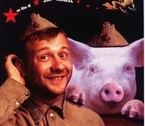 THE LIFE AND AMAZING ADVENTURES OF THE SOLDIER IVAN CHONKIN by
Voinovich, Vladimir
At the beginning of World War II, a not-too-bright Red Army soldier, abandoned and forgotten by his superiors, bravely
defends a Soviet airplane, gets a girlfriend, arrests the entire local apparatus of the secret police, and beats back
the attack of an entire regiment...all by accident.
THE LIFE AND AMAZING ADVENTURES OF THE SOLDIER IVAN CHONKIN by
Voinovich, Vladimir
At the beginning of World War II, a not-too-bright Red Army soldier, abandoned and forgotten by his superiors, bravely
defends a Soviet airplane, gets a girlfriend, arrests the entire local apparatus of the secret police, and beats back
the attack of an entire regiment...all by accident.(Full summary here)
 SNOW by
Paustovsky, Konstantin
During the Great Patriotic War, a soldier on leave returns to his childhood home, only to find that his
father has died and a strange young woman is now living in his house. Out of kindness and a feeling of
responsibility, the woman tries to make the home seem familiar for the soldier. The soldier is grateful and touched.
He is certain that they have met before in the Crimea and that fate has now reunited them. Actually, the woman has
never been to the Crimea--but does it really matter?
(Full summary here)
SNOW by
Paustovsky, Konstantin
During the Great Patriotic War, a soldier on leave returns to his childhood home, only to find that his
father has died and a strange young woman is now living in his house. Out of kindness and a feeling of
responsibility, the woman tries to make the home seem familiar for the soldier. The soldier is grateful and touched.
He is certain that they have met before in the Crimea and that fate has now reunited them. Actually, the woman has
never been to the Crimea--but does it really matter?
(Full summary here)
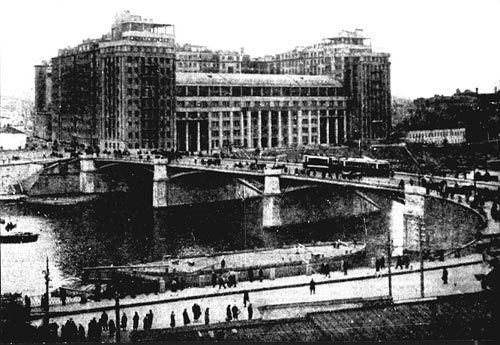 HOUSE ON THE EMBANKMENT by
Trifonov, Yuri
(1978). Revolves around life in a famous Moscow apartment house which served as the home of many of the
Soviet elite. The rule in the house is the same as in a tram car: never stick your neck out.
HOUSE ON THE EMBANKMENT by
Trifonov, Yuri
(1978). Revolves around life in a famous Moscow apartment house which served as the home of many of the
Soviet elite. The rule in the house is the same as in a tram car: never stick your neck out.
(Full summary here)
 THE STRUGGLE IN SPACE by
Beliayev, Aleksandr
(1928). Rocket-airships, radio-controlled tanks, and Death Rays. Evil Americans try to destroy the
socialist
paradise of the future, but the Soviets counterattack and win. Remnant capitalists flee to an underground base near
Antartica, planning to escape into outer space. Socialism on one planet!
THE STRUGGLE IN SPACE by
Beliayev, Aleksandr
(1928). Rocket-airships, radio-controlled tanks, and Death Rays. Evil Americans try to destroy the
socialist
paradise of the future, but the Soviets counterattack and win. Remnant capitalists flee to an underground base near
Antartica, planning to escape into outer space. Socialism on one planet! (Full summary here)
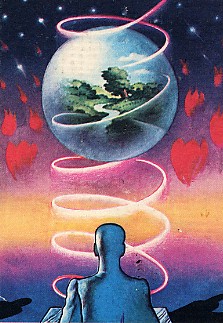 ABDUCTION OF THE SORCERER by
Bulychev, Kir.
(1981). Time travelers from the future stop off in the present on their way to the past to kidnap a
13th-century sorcerer. They want to take him back to the 27th century to invent neat things [a love potion?]there. A good-hearted
Soviet citizen helps the futurites, but all she gets for her trouble is a 13th-century dress and dubious remarks about her
accent.
ABDUCTION OF THE SORCERER by
Bulychev, Kir.
(1981). Time travelers from the future stop off in the present on their way to the past to kidnap a
13th-century sorcerer. They want to take him back to the 27th century to invent neat things [a love potion?]there. A good-hearted
Soviet citizen helps the futurites, but all she gets for her trouble is a 13th-century dress and dubious remarks about her
accent.(Full summary here)
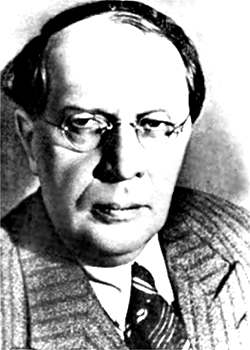 AZURE CITIES by
Tolstoy, Aleksei
(1925). Utopian socialism clashes with everyday reality, leading to murder. "Before the investigator
there unfolded a passionate tale of a tormenting, impatient, and feverish imagination." ...
"There is more manhood in selling doughnuts than in rushing with naked blade into the attack."
AZURE CITIES by
Tolstoy, Aleksei
(1925). Utopian socialism clashes with everyday reality, leading to murder. "Before the investigator
there unfolded a passionate tale of a tormenting, impatient, and feverish imagination." ...
"There is more manhood in selling doughnuts than in rushing with naked blade into the attack." (Full summary here)
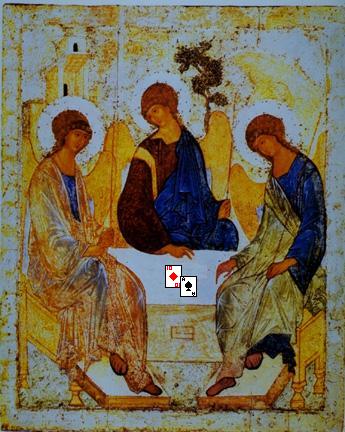 LOSING BET by
Chernyonok, Mikhail
(1979). In Novosibirsk, militia detective Anton Biriukov unravels a web of fraud, illegal book speculation, icon forgery and murder.
The investigation spans the Soviet Union from Siberia to the Black Sea and back.
LOSING BET by
Chernyonok, Mikhail
(1979). In Novosibirsk, militia detective Anton Biriukov unravels a web of fraud, illegal book speculation, icon forgery and murder.
The investigation spans the Soviet Union from Siberia to the Black Sea and back.
(Full summary here)
 HUNTING FOR THE PAST by
Prozorovsky, Lev
(1985). Chasing a CIA spy with links to the Nazi past through Latvia and Estonia. KGB agents are firm, but kindly and conduct their
investigation by the book, even when patriotic passions are inflamed by dirty collaborators and traitors.
HUNTING FOR THE PAST by
Prozorovsky, Lev
(1985). Chasing a CIA spy with links to the Nazi past through Latvia and Estonia. KGB agents are firm, but kindly and conduct their
investigation by the book, even when patriotic passions are inflamed by dirty collaborators and traitors.
(Full summary here)
 MARYA THE BOLSHEVIK by
Neverov, Aleksandr
(1921). Women's liberation comes to a post-revolutionary Russian village. "That was the Bolsheviks' style--to
let women have their way."
MARYA THE BOLSHEVIK by
Neverov, Aleksandr
(1921). Women's liberation comes to a post-revolutionary Russian village. "That was the Bolsheviks' style--to
let women have their way."(Full summary here)
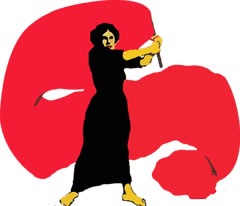 SISTERS by
Veresaev, Vikenty
(1933). One of two Komsomol sisters is ruthless in rooting out kulaks and forcing peasants into the kolkhozes. The other sister
defies Party orders and works instead for "voluntary" collectivization. She is about to be purged but is saved when Stalin publishes his
"Giddy From Success" article denouncing the excesses of forced collectivization.
SISTERS by
Veresaev, Vikenty
(1933). One of two Komsomol sisters is ruthless in rooting out kulaks and forcing peasants into the kolkhozes. The other sister
defies Party orders and works instead for "voluntary" collectivization. She is about to be purged but is saved when Stalin publishes his
"Giddy From Success" article denouncing the excesses of forced collectivization.
(Full summary here)
 SNOWBALL BERRY RED by
Shukshin, Vasily
(1973). An ex-con moves to the countryside, hoping to start a new life. He gets side-tracked with a bit
of debauchery, but eventually settles down as a tractor driver. Unfortunately, his old gang, unhappy about
being abandoned, catch up with him for a final, fatal confrontation.
SNOWBALL BERRY RED by
Shukshin, Vasily
(1973). An ex-con moves to the countryside, hoping to start a new life. He gets side-tracked with a bit
of debauchery, but eventually settles down as a tractor driver. Unfortunately, his old gang, unhappy about
being abandoned, catch up with him for a final, fatal confrontation. (Full summary here)
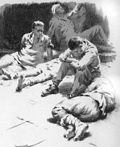 FATE OF A MAN by
Sholokhov, Mikhail
(1957). A Soviet soldier is captured and consigned to the Nazi concentration camps. He suffers
hunger, torture, and humiliation before finally managing to escape and return to the Red Army.
However, his wife and children all die during the war. When peace and demobilization come, he sinks into
drepression and drunkenness, until he finds an orphan boy to care for, giving him a renewed reason to
live.
FATE OF A MAN by
Sholokhov, Mikhail
(1957). A Soviet soldier is captured and consigned to the Nazi concentration camps. He suffers
hunger, torture, and humiliation before finally managing to escape and return to the Red Army.
However, his wife and children all die during the war. When peace and demobilization come, he sinks into
drepression and drunkenness, until he finds an orphan boy to care for, giving him a renewed reason to
live.
(Full summary here)
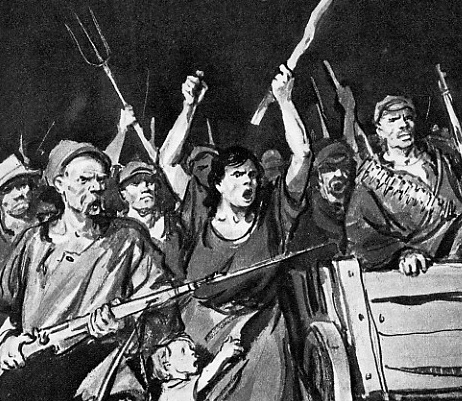 IRON FLOOD by
Serafimovich, Aleksandr
(1924). A squabbling, undisciplined, and disorganized rabble of Red fighters and refugees attempts
to flee from some pursing Cossacks and join up with the main Red Army units. They escape annihilation only by
finally uniting and submitting to the iron will of their newly elected commander, who promises death
as punishment for the slightest insubordination.
IRON FLOOD by
Serafimovich, Aleksandr
(1924). A squabbling, undisciplined, and disorganized rabble of Red fighters and refugees attempts
to flee from some pursing Cossacks and join up with the main Red Army units. They escape annihilation only by
finally uniting and submitting to the iron will of their newly elected commander, who promises death
as punishment for the slightest insubordination. (Full summary here)
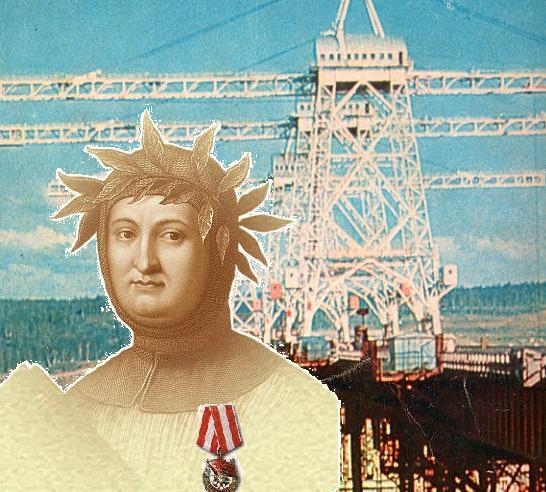 PETRARCH'S SONNET by
Pogodin, Nikolai
(1956). A solid, reliable, middle-aged man (Sukhodolov) develops a pure (Petrarchic) love for a young
woman and starts writing her letters (his "sonnets"). Those still in the thrawl of the "bourgeois morality" of the
Stalinst past get in a tizzy over this supposed violation of socialist morality (even though the lovers never
actually do anything physically). An official investigation is launched, but Sukhodolov refuses to cooperate, saying
that there are some reaches of the human heart and human emotion which are none of the Party's business.
PETRARCH'S SONNET by
Pogodin, Nikolai
(1956). A solid, reliable, middle-aged man (Sukhodolov) develops a pure (Petrarchic) love for a young
woman and starts writing her letters (his "sonnets"). Those still in the thrawl of the "bourgeois morality" of the
Stalinst past get in a tizzy over this supposed violation of socialist morality (even though the lovers never
actually do anything physically). An official investigation is launched, but Sukhodolov refuses to cooperate, saying
that there are some reaches of the human heart and human emotion which are none of the Party's business.
(Full summary here)
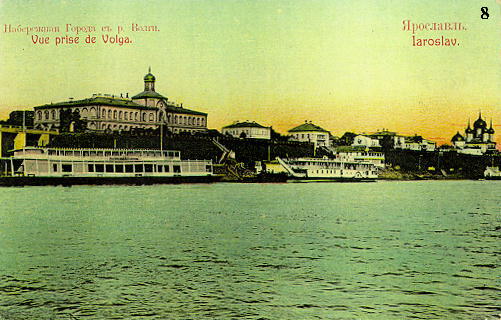 THE VOLGA FALLS TO THE CASPIAN SEA by
Pilnyak, Boris
(1931). Sabotage and betrayal on the construction site as true communists struggle to alter nature and
establish a new morality.
THE VOLGA FALLS TO THE CASPIAN SEA by
Pilnyak, Boris
(1931). Sabotage and betrayal on the construction site as true communists struggle to alter nature and
establish a new morality.
(Full summary here)
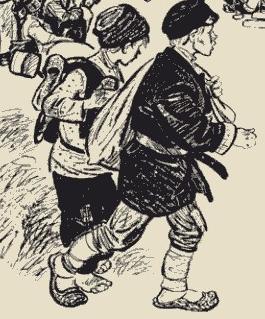 TASHKENT, CITY OF BREAD
by
Neverov, Aleksandr (1923) A young boy sets out on a harrowing journey from his remote
village to Tashkent, hoping to find grain for his starving family. Along the way he faces death and
despair. But amid the cruelty he also finds friendship and kindness. He eventually returns home to the sad
news that most of his family is dead. He is able to look past the tragedy, however, and confidently pledges
to build everything anew.
TASHKENT, CITY OF BREAD
by
Neverov, Aleksandr (1923) A young boy sets out on a harrowing journey from his remote
village to Tashkent, hoping to find grain for his starving family. Along the way he faces death and
despair. But amid the cruelty he also finds friendship and kindness. He eventually returns home to the sad
news that most of his family is dead. He is able to look past the tragedy, however, and confidently pledges
to build everything anew.(Full summary here)
 SIBERIA
by Markov, Georgi (1973).
A sweeping epic of love, revolution, and nature set in snow-swept Siberia. Bolsheviks, kulaks, Social Revolutionaries,
honest hard-working peasants, and giant fish-creatures of legend all clash as tsarism crumbles.
SIBERIA
by Markov, Georgi (1973).
A sweeping epic of love, revolution, and nature set in snow-swept Siberia. Bolsheviks, kulaks, Social Revolutionaries,
honest hard-working peasants, and giant fish-creatures of legend all clash as tsarism crumbles. (Full summary here)
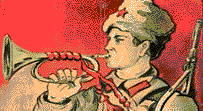 A WEEK
by
Libedinsky, Yuri (1922). A peasant revolt rips through a remote town in the Urals. It is
eventually put down, but not before the leading local Communists are brutally murdered. Frank portrayal of the
hostility of the peasants to Soviet power and of many of the Party's failings.
A WEEK
by
Libedinsky, Yuri (1922). A peasant revolt rips through a remote town in the Urals. It is
eventually put down, but not before the leading local Communists are brutally murdered. Frank portrayal of the
hostility of the peasants to Soviet power and of many of the Party's failings.
(Full summary here)
 SEVENTEEN MOMENTS OF SPRING by
Semyonov, Julian
(1968). Soviet super-spy Stirlitz, working undercover in the Nazi SS, defeats an attempt by
the U.S. and Britain to conclude a separate peace with Nazi Germany and open a joint front against the Soviet Union.
SEVENTEEN MOMENTS OF SPRING by
Semyonov, Julian
(1968). Soviet super-spy Stirlitz, working undercover in the Nazi SS, defeats an attempt by
the U.S. and Britain to conclude a separate peace with Nazi Germany and open a joint front against the Soviet Union.(Full summary here)
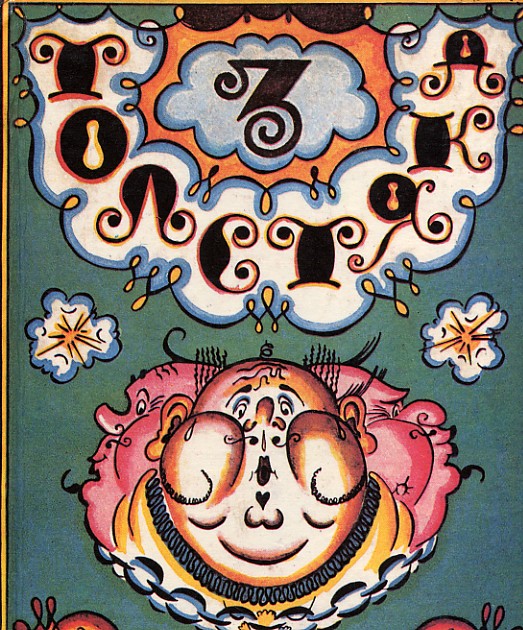 THREE FAT MEN by
Olesha, Yuri
(1924).
A fantastic fairy tale of revolution. A tightrope walker, balloons, very large pastries and a brave little girl help
topple the dictatorship of three very fat men. (Full summary here)
THREE FAT MEN by
Olesha, Yuri
(1924).
A fantastic fairy tale of revolution. A tightrope walker, balloons, very large pastries and a brave little girl help
topple the dictatorship of three very fat men. (Full summary here)
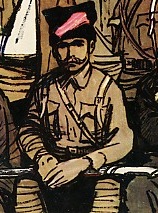 CHAPAEV by
Furmanov, Dmitri (1923). The charismatic Red Army commander Chapaev, along with his faithful political
commisar, Klichkov, fights a never-ending battle against Kolchak, Cossacks, and other enemies of Communism. But in the
end, he gets caught with his pants down.
CHAPAEV by
Furmanov, Dmitri (1923). The charismatic Red Army commander Chapaev, along with his faithful political
commisar, Klichkov, fights a never-ending battle against Kolchak, Cossacks, and other enemies of Communism. But in the
end, he gets caught with his pants down. (Full summary here)
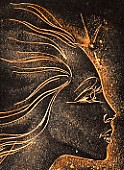 AELITA by
Tolstoy, Alexsei (1923). A Soviet engineer and his adventurer-companion blast
off for Mars in a home-made spaceship. There they discover an ancient alien civilization. While the engineer falls in love with the mysterious
Aelita, the adventurer dallies with a servant girl (even though he has a wife back in Petrograd). Martian society is
on the brink of revolution. The Soviet
Earthlings, experienced at this sort of thing, take charge of the
workers' uprising. The Martian government strikes back and crushes the rebellion. The Soviets escape from the
planet in the nick of time as millions of gigantic, hate-filled spiders surge up from the bowels of the
planet.
(Full summary here)
AELITA by
Tolstoy, Alexsei (1923). A Soviet engineer and his adventurer-companion blast
off for Mars in a home-made spaceship. There they discover an ancient alien civilization. While the engineer falls in love with the mysterious
Aelita, the adventurer dallies with a servant girl (even though he has a wife back in Petrograd). Martian society is
on the brink of revolution. The Soviet
Earthlings, experienced at this sort of thing, take charge of the
workers' uprising. The Martian government strikes back and crushes the rebellion. The Soviets escape from the
planet in the nick of time as millions of gigantic, hate-filled spiders surge up from the bowels of the
planet.
(Full summary here)
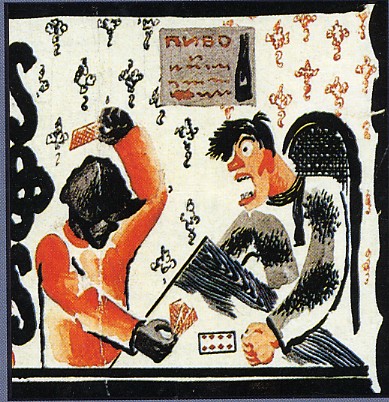 THE EMBEZZLERS
by
Kataev, Valentin (1926) The accidental embezzlement of 12,000 rubles leads to a
merry romp through the excesses of NEP-era Moscow, Leningrad, and the provinces. Champange, vodka,
and dancing Germans abound. The pleasant company of former princesses and countesses is
sought out--
and can be had for 100 rubles. The deceased emperor Nikolai II makes a comeback, but soon regrets it as
he gets involved in a brawl and has a third of his beard ripped out.
(Full summary here)
THE EMBEZZLERS
by
Kataev, Valentin (1926) The accidental embezzlement of 12,000 rubles leads to a
merry romp through the excesses of NEP-era Moscow, Leningrad, and the provinces. Champange, vodka,
and dancing Germans abound. The pleasant company of former princesses and countesses is
sought out--
and can be had for 100 rubles. The deceased emperor Nikolai II makes a comeback, but soon regrets it as
he gets involved in a brawl and has a third of his beard ripped out.
(Full summary here)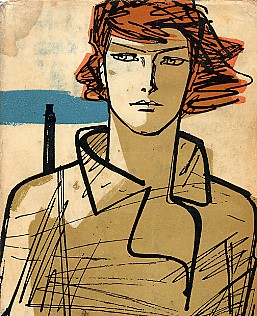 THE FORTY-FIRST by
Lavrenyov, Boris
(1924).
A female sniper with Red partisans misses her 41st vicitim (a White officer), then winds up stranded with him
on a desert island, where they fall in love. However, the White's essentially selfish, bourgeois nature
becomes apparent and she shoots him, fulfilling her mission and her class destiny
.... (Full summary here)
THE FORTY-FIRST by
Lavrenyov, Boris
(1924).
A female sniper with Red partisans misses her 41st vicitim (a White officer), then winds up stranded with him
on a desert island, where they fall in love. However, the White's essentially selfish, bourgeois nature
becomes apparent and she shoots him, fulfilling her mission and her class destiny
.... (Full summary here)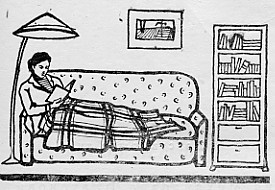 ALONE by Aleshin, Samuil
(1956).
An adulterous relationship breaks up two happy marriages.
The adandoned spouses struggle to hold onto their wayward partners. The adulterers try to quash their impulses, but in the end they must be
honest to themselves and to others by admitting their love. The Party tries to intervene, but is rebuffed. Who is to blame? Is it right to
live a lie in order to preserve social propriety? Is it right to tell the truth when it only does harm to the blameless? What to do when duty is the
same as misery? Is it ever too late for happiness? No black-and-white answers are offered to these questions--an ambiguity made possible by the
conditions of The Thaw. But the author makes it clear that an honest woman, thus abandoned, bears no shame and should
continue to hold her head high. Every human being retains his or her individual worth. Science teaches us, "In life, in man, everything is individual."
(more)
ALONE by Aleshin, Samuil
(1956).
An adulterous relationship breaks up two happy marriages.
The adandoned spouses struggle to hold onto their wayward partners. The adulterers try to quash their impulses, but in the end they must be
honest to themselves and to others by admitting their love. The Party tries to intervene, but is rebuffed. Who is to blame? Is it right to
live a lie in order to preserve social propriety? Is it right to tell the truth when it only does harm to the blameless? What to do when duty is the
same as misery? Is it ever too late for happiness? No black-and-white answers are offered to these questions--an ambiguity made possible by the
conditions of The Thaw. But the author makes it clear that an honest woman, thus abandoned, bears no shame and should
continue to hold her head high. Every human being retains his or her individual worth. Science teaches us, "In life, in man, everything is individual."
(more)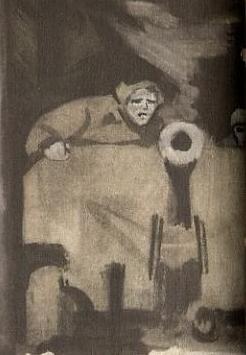 VOLOKOLAMSK HIGHWAY by Bek, Aleksandr
(1944).
One batallion's battle against the Nazis as well as their own fears in the early stages of the Defense of Moscow.
Initially terrified by the seemingly unstoppable enemy, the ranks are plagued with cowardice and desertion.
A few
executions help restore discipline, and a few well-planned sneak attacks teach the men that the Germans bleed and die,
too. In the end, the troops fight bravely, the commanders strategize creatively, and the Red Army wins valuable
time. (Full summary here)
VOLOKOLAMSK HIGHWAY by Bek, Aleksandr
(1944).
One batallion's battle against the Nazis as well as their own fears in the early stages of the Defense of Moscow.
Initially terrified by the seemingly unstoppable enemy, the ranks are plagued with cowardice and desertion.
A few
executions help restore discipline, and a few well-planned sneak attacks teach the men that the Germans bleed and die,
too. In the end, the troops fight bravely, the commanders strategize creatively, and the Red Army wins valuable
time. (Full summary here)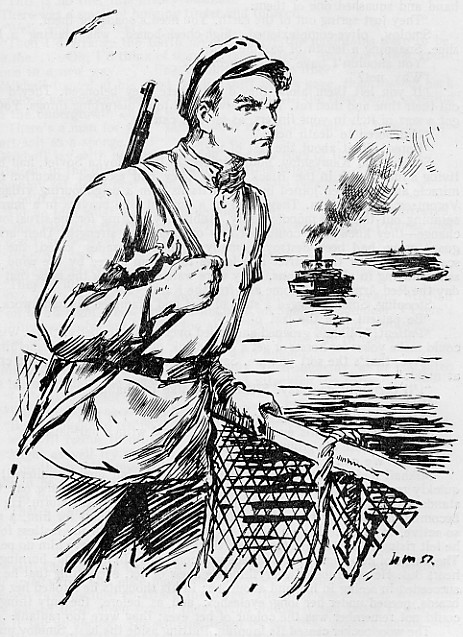 IMMORTALITY by Bubennov, Mikhail
(1940). The Whites operate a "death barge", full of prisoners--Bolsheviks and ordinary peasants--who
are hauled out one by one to be shot or hung. The captives attempt a rebellion, partisans try a rescue, and
everyone nearly drowns in a storm. After capturing Kazan, the Red Army finally shows up to liberate the barge.
(Full summary here)
IMMORTALITY by Bubennov, Mikhail
(1940). The Whites operate a "death barge", full of prisoners--Bolsheviks and ordinary peasants--who
are hauled out one by one to be shot or hung. The captives attempt a rebellion, partisans try a rescue, and
everyone nearly drowns in a storm. After capturing Kazan, the Red Army finally shows up to liberate the barge.
(Full summary here)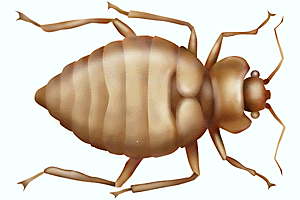 THE BEDBUG by Mayakovsky, Vladimir
(1929).
A philistine from the NEP era gets frozen and is revived fifty years later in 1979. The moderns at first mistake
him for
an honest worker, but then correctly identify him as a bourgeoisus vulgaris, a blood-sucking insect similar
to, but more dangerous than, the bedbug. He is put on display in a cage equipped with special filters to trap all the
dirty words.
(Full summary here)
THE BEDBUG by Mayakovsky, Vladimir
(1929).
A philistine from the NEP era gets frozen and is revived fifty years later in 1979. The moderns at first mistake
him for
an honest worker, but then correctly identify him as a bourgeoisus vulgaris, a blood-sucking insect similar
to, but more dangerous than, the bedbug. He is put on display in a cage equipped with special filters to trap all the
dirty words.
(Full summary here)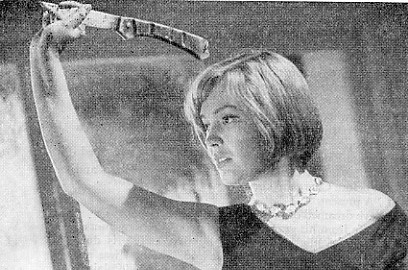 CALLOW YOUTH by Rekemchuk, Aleksandr
(1962). In Siberia, a young worker named Nikolai is dispatched to a nearby town to demand bricks for his
construction team. He quickly succeeds and also helps convert the brick factory to new technology. A friend
narrowly avoids involvement in a shady money-making scheme; Nikolai gets a kiss; repressed Old Bolsheviks
live happily ever after; and, inspired by Yuri Gagarin, practically everyone volunteers to go to the moon.
(more)
CALLOW YOUTH by Rekemchuk, Aleksandr
(1962). In Siberia, a young worker named Nikolai is dispatched to a nearby town to demand bricks for his
construction team. He quickly succeeds and also helps convert the brick factory to new technology. A friend
narrowly avoids involvement in a shady money-making scheme; Nikolai gets a kiss; repressed Old Bolsheviks
live happily ever after; and, inspired by Yuri Gagarin, practically everyone volunteers to go to the moon.
(more)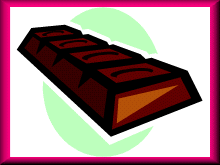 CHOCOLATE by Tarasov-Rodionov, Aleksandr
(1922). A local Cheka chief is falsely accused of bribery and corruption. Revolutionary justice
demands that he be shot, despite his innocence.
CHOCOLATE by Tarasov-Rodionov, Aleksandr
(1922). A local Cheka chief is falsely accused of bribery and corruption. Revolutionary justice
demands that he be shot, despite his innocence. (Full summary here)
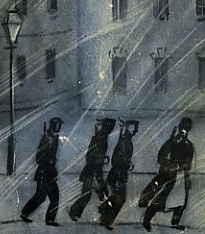 CITIES AND YEARS by Fedin, Konstantin
(1924). A spineless Russian intellectual is interred in Germany at the start of World War I. After
the war, he fails to find his place in Revolutionary society. He betrays his love and helps a counterrevolutionary
escape Soviet justice.
CITIES AND YEARS by Fedin, Konstantin
(1924). A spineless Russian intellectual is interred in Germany at the start of World War I. After
the war, he fails to find his place in Revolutionary society. He betrays his love and helps a counterrevolutionary
escape Soviet justice.
(Full summary here)
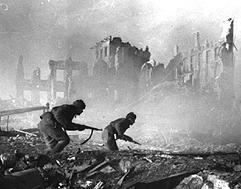 DAYS AND NIGHTS by Simonov, Konstantin
(1944). A batallion commander and his troops defend three apartment buildings (or rather the rubble of t
hree buildings) for seventy days during the Battle of Stalingrad. They suffer incredible casualties, demonstrate
incredible bravery, and get lots of medals. And during it all, the hero even finds time to fall in love, get married, and
have a bachelor party.
DAYS AND NIGHTS by Simonov, Konstantin
(1944). A batallion commander and his troops defend three apartment buildings (or rather the rubble of t
hree buildings) for seventy days during the Battle of Stalingrad. They suffer incredible casualties, demonstrate
incredible bravery, and get lots of medals. And during it all, the hero even finds time to fall in love, get married, and
have a bachelor party.
(Full summary here)


by Arkady Gaidar
(1935)
The peaceful Soviet motherland is subjected to a perfidious sneak attack by bourgeois forces. As the Soviet fathers and older brothers are killed, little children have to join the battle. Once such child is the Malchik-Kibalchish. He is captured and tortured, but remains true to his word and does not reveal the great military secret of what makes the motherland and the workers of the world so strong. His bravery gives the Red Army the time it needs to ride to the rescue.
(Complete text in both English and Russian))

by Ilya Ilf & Evgeny Petrov
(1934)
Soviet funny men Ilya Ilf and Evgeny Petrov, besides creating Ostap Bender (hero of the classic comic novels The Twelve Chairs and The Golden Calf), wrote numerous sketches, stories, plays, etc. One such story, Conversations at Tea, touches on a generation gap between an Old Bolshevik and his 12-year-old son, arising from the excessively "revolutionary" education the boy is receiving at school. Fortunately, the Central Committee steps in just in time withi a back-to-basics decree, thereby saving a hapless 8-year-old from being worked over politically. The story also takes a swipe at politically correct but inane poetry as was often celebrated by super-orthodox literay groups such as RAAP.
(Click here to read "Conversations at Tea" by Ilf & Petrov.)

from The Naked Year
by Boris Pilnyak
(1922)
"Russia is a mirage...a delusion...all wood demons, witches, and water sprites." Thus, in part, an old priest attempts to explain the Revolution, and indeed the whole of Russian history in this excerpt from Boris Pilnyak's powerful 1922 novel The Naked Year.
Primitive, superstitious, and anarchic, the Russian peasants, by fleeing government, have created a new government, bringing with them the sounds of demons drumming and witches waggling their breasts: Kolkhoz, Gviu, Shooya, Glav-boom!
(Click here to read this extract from Boris Pilnyak's The Naked Year.)
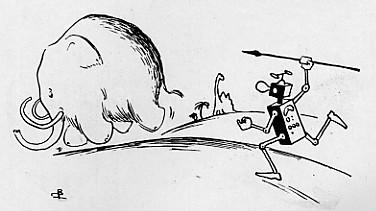
SOVIET FUNNIES
Cartoons from the
Soviet Era
(Click here to laugh your troubles away.)
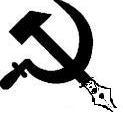
Central Committee Decree
23 April 1932
(Click here to read the decree.)
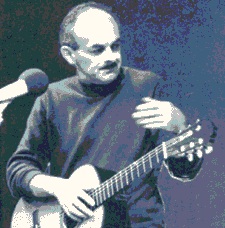
Bulat Okudzhava
"Singers detested me. Guitarists were terrified of me."
One of the Soviet Union's most beloved of bard poets was Bulat Okudzhava (1924-1997). Okudzhava's songs are melodic and poetic and not overtly political. Nonetheless, they received no official publication until the late 1970s. Official recordings of his works began to appear in the 1980s, and in the fateful year of 1991, Bulat Okudzhava was awarded the USSR State Prize.
SovLit.net is pleased to present the lyrics of six of Okudzhava's songs (in Russian with English translations by Alec Vagapov) along with MP3 files of Bulat himself singing.
(Click here to read and listen to the songs of Bulat Okudzhava)
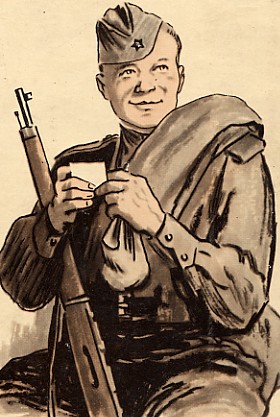
at War!
Reports, articles, sketches, propaganda, stories, and more from the period of the Great Patriotic War, 1941- 1945. Includes:
Vasili Tyorkin: A Book About a Soldier. by Aleksandr Tvardovsky. The most popular piece of literature about the war read by soldiers during the war. It presented a new soldier folk hero who was clever, witty, inventive, thoughtful, resourceful, dependable, courageous, and fun-loving. Vasili Tyorkin fought Nazis hand-to-hand, was wounded several times, slogged through marshes, swam a freezing river to rescue his comrades, shot down a plane with his rifle, settled arguments, made with the wisecracks and could play a mean accordion.
In the War by Vasili Grossman. Short story about a loner tank-driver who slowly comes to bond with his fellow tank-crew member and learn the strength and value of comradeship and love.
June-December by Konstantin Simonov. Report on the changes in the psychology of Soviet troops after the first six months of war. "Our army has learnt how to conquer the Germans."
In Berlin's Neighborhoods by Boris Gorbatov. In Berlin with the conquering Red Army, Gorbatov gloats and taunts Berliners. "Hitler's citadel of obscurantism and piracy is at its end."
In the Name of Kirov by Aleksandr Fadeev. Report on workers in Leningrad during the blockade. Fadeev conducts a literary evening amid exploding shells.
Volga - Mississippi by Konstantin Fedin. A war-time appeal to Americans, comparing the two great rivers.
Freedom or Death by Ilya Ehrenburg. Written in the first weeks of the war, this short piece summarizes the Nazis' evil intentions and characterizes the Soviet resolve to fight on mercilessly until Victory Day!
In The Main Line of Attack by Vasili Grossman. (Report on Siberian troops in Stalingrad.)
The Last Wish by Pyotr Pavlenko. (A dying marine gets recorded on film.)
(more)
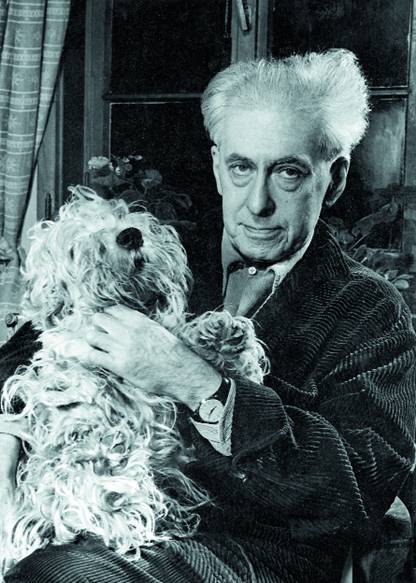
EHRENBURG BLASTS CONSERVATIVES AT 2ND CONGRESS OF SOVIET WRITERS !
(1954)
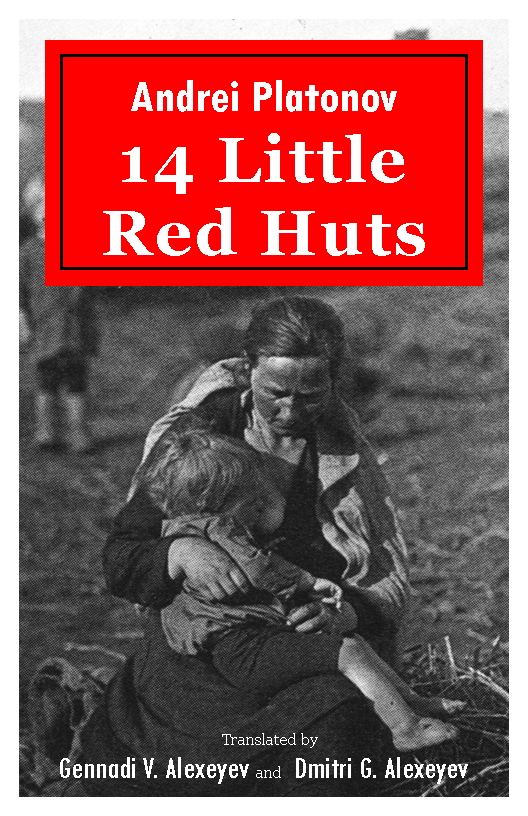
FOURTEEN
LITTLE RED HUTS
A Full Translation !
In 1932, in the midst of a food crisis and famine, Andrei Platonov produced one of his finest plays, Fourteen Little Red Huts. The play touches on the trauma, hunger, and death which accompanied Stalin's rapid collectivization of agriculture. It also lampoons Western intellectuals, such as George Bernard Shaw, who visited the Soviet Union in 1931 and confidently reported that there was no famine or hunger.
SovLit.net is proud to present the text of Fourteen Little Red Huts in a full translation by Gennadi V. Alexeyev and Dmitri G. Alexeyev. (Click here to read Act One of Fourteen Little Red Huts.) (Click here for Act Two.) (Click here for Act Three.) (Click here for Act Four.)

In 1923, Boris Pilnyak was riding high on the wave of critical acclaim occasioned by his collage-novel The Naked Year, but he was also constantly pestered by an inconvenient question: "Are you for or against the Communists?" That same year, Leon Trotsky was still perceived as Lenin's heir-apparent, but the Politburo cabal against him, spearheaded by Stalin, Zinoviev, and Kamenev, was gathering strength. In the midst of it all, the political leader took out time to pen his thoughts on the literary leader.
Trotsky saw Pilnyak as a realist, an excellent observer with a fresh eye and a good ear. He praised Pilnyak for his sharp and accurate portrayal of the fragmented daily life of the time, for catching the howling of revolutionary poetry. Nonetheless, despite the literary merits, Trotsky finds that Pilnyak's work lacks the essential axis around which modern life revolves--the Revolution. Trostky is troubled by Pilnyak's provincialism, his retrograde historical philosophy, and by the fact that for Pilnyak the Red Army does not even exist! The pernicious influence of Andrei Bely is another feature that Trotsky hopes Pilnyak will jettison.
In the end, Trotsky has hope for Pilnyak's further development. True, Pilnyak's technique is unstable and he sometimes elicits bewilderment; but, Trotsky concludes, "Pilnyak is talented....One can only wish him success."
(Click here to read the entire text of "On Boris Pilnyak" by Leon Trotsky)
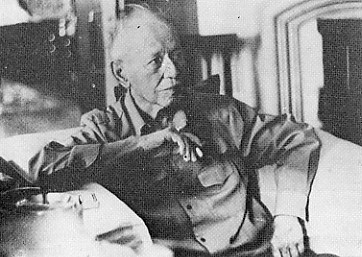
107 YEARS OF SHOLOKHOV
Biography of Mikhail Sholokov. A cradle-to-grave summary of the writer's life.
"Birthmark" (1924) Sholokhov's very first short story, about the clash of a young Red commander and the wizened old leader of an anti-Soviet band of marauding Cossack brigands. The complete text in English.
"Fate of a Man" (1957) Detailed summary of Sholokhov's tale about a Soviet soldier who is captured by the Nazis during the war. He loses his entire family and his will to live. After the war he slips into drunkenness and depression until a young boy gives him a new reason for living.
Speech to the 2nd Congress of Soviet Writers (1954) Text of Sholokhov's speech to the 2nd Congress of Soviet Writers, in which he gives a lukewarm endorsement to the Thaw, calling most post-war literature dull and boring, but avoiding discussion of calls for more openness, honesty, and "sincerity" in Soviet literature.
Speech to the 20th Congress of The Communist Party of the Soviet Union (1956) Text of Sholokhov's speech to the de-Stalinizing 20th Party Congress. He blasts Soviet writers, calling most of them "dead souls".
About Little Boy Harry and Big Mister Salisbury (1960) An article in which Sholokov attacks American journalist Harrison Salisbury for the meanness and stupidity of his articles on Sholovkhov's Virgin Soil Upturned. Sholokhov accuses Salisbury of metaphoric murder and urges that he be publicly flogged
Sholokhov Slams Solzhenitsyn! (1967) In a letter to the Union of Writers, Sholokhov demands that dissident writer Aleksandr Solzhenitsyn be excluded from the Union. The reason: Solzhenitsyn is either insane or a dangerous anti-Soviet; either way, says Sholokhov, "the man cannot be trusted with a pen." Further, Sholokhov calls Solzhenitsyn's writing "feeble and foolish" and lumps him in with the Vlasovites, those Soviets who betrayed their motherland and joined the Nazis to fight against the USSR during the Great Patriotic War.
Introducing Sholokhov by Aleksandr Serafimovich. The short introduction to Tales of the Don (1926), Sholokhov's first collection of stories, written by veteran Soviet-Cossack writer A. Serafimovich. "Comrade Sholokhov's stories stand out like a steppeland flower."
About Sholokhov by< Konstantin Fedin. "He has never side-stepped the contradictions inherent in life....Sholokhov omits nothing, he writes the whole truth."
M.A. Sholokhov by C.P. Snow. "The Quiet Don is a great novel...but a mysterious and difficult one. It speaks of the bafflement of ordinary men...but under the surface there is a subjective, passionate sense of life. A tragic sense of life."
An Artist Who Has Enriched The World by Yuri Bondarev. "Sholokhov never follows a straight corridor carpeted with comfortable truths. On the contrary, his target is the all-absorbing truth that is won through struggle and suffering, a truth that is rugged and unkempt and baptized in blood."
The Making of "The Fate of a Man" by Vladimir Monakhov.. Sholokhov gives advice to filmmakers on adapting his story for the screen. "If you want to make a film out of my story...make it a bit on the boring side."
A Sholokhov Photo Gallery. Photos from the life of Mikhail Sholokhov. Includes some embarrassing baby pictures.
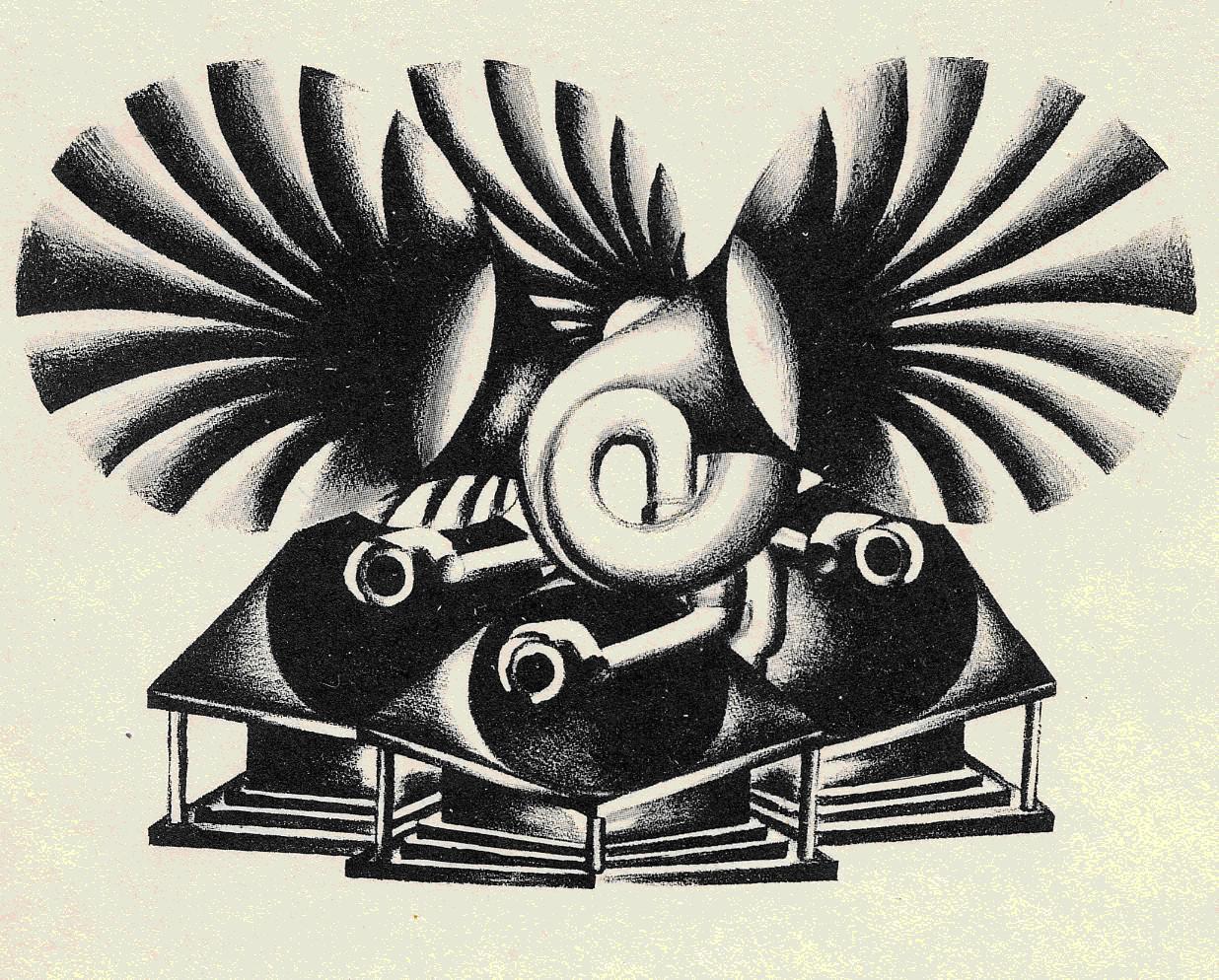
An independent journal explained and condemned
(with exaggerations!)
"Trash, not literature!"
In 1979, Vassily AKSYONOV, Andrei BITOV, Viktor YEROFEEV, Fazil ISKANDER, and Evgeny POPOV edited and issued METROPOL, an independent literary almanac providing shelter for "homeless" Soviet literature, which was shunned by offical organs. The lack of censorship and the wildcat nature of this venture provoked a firestorm of criticism from official sources.
SovLit.net now offers: Introduction to Metropol, wherein the almanac's editors explain their motivation and goals; Metropol Minutes, minutes of a Writers Union meeting wherein the editors are hauled in and raked over the coals; and Pornography of the Soul, a selection of official Soviet criticism of Metropol and its editors.
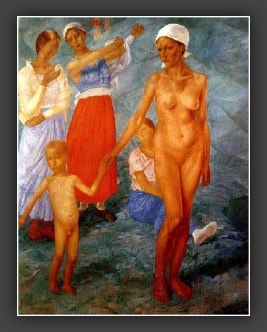
Stereotype?
Is "Marina's Illness" an affirmation of the value of maternal labor in the socialist society? Or just another sexist stereotype of female behavior? Read and decide for yourself.
(Click here to read the entire text of Vikenty Veresaev's "Marina's Illness")
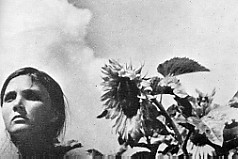
by Aleksandr Dovzhenko
(1953)
The last silent film in the history of Soviet cinema was Aleksandr Dovzhenko's 1930 classic Earth. It tells of peasants uniting in a collective to purchase a tractor and fighting off an evil kulak's attempt to sabotage the plan. Over twenty years later, in 1953, Dovzhenko was still attracted by the theme of the earth and the men and women who till the soil and feed the nation. In this address to the Secretariate of the Soviet Writers Union, Dovzhenko tells of his plans for a new triolgy on the development of the collective farms as well as the debt owed by writers to the kolkhoz workers.
(Click here to read the entire text of "Writing Screenplays About the Earth")
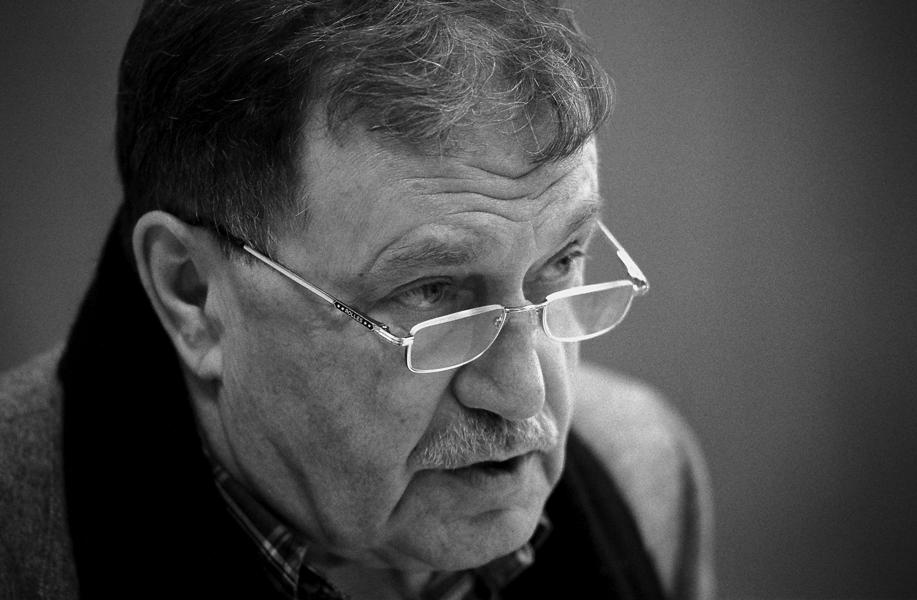
VASSILY AKSYONOV
In 1937, when Vassily Aksyonov was five years old, his parents were arrested and shipped off to the camps, and Aksyonov himself was placed in a special orphanage for offspring of enemies of the people. In his conversations with Pohlmann, Aksyonov recounts these events, as well as his time in medical school, his wild, beatniklike youth, and his sudden rise to stardom following the publication of Colleagues in 1960. But as the Thaw started to freeze over again, there were public dressings-down by Khrushchev and pressures to reform and recant.
Another crisis arose in Aksyonov's life when he and several other authors went wildcat and produced the independent literary almanac METROPOL. Aksyonov and the other editors claimed the almanac was providing shelter for "homeless" literature, which could find no place in official publications. Offical critics, however, labeled the project "pornography of the soul" or, less delicately, "a hunk of sh*t".
John Pohlmann's Conversations with Vassily Aksyonov, is surely a valuable resource for those studying not only Aksyonov's life and work, but the life of the Soviet Union as well.
(Click here to read the entire text of "Conversations with Aksyonov")
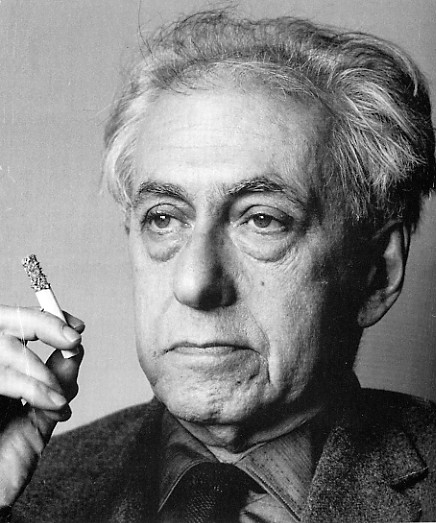
Ilya Ehrenburg
According to the logic of his times, Ehrenburg should have been purged or "disappeared" at least three or four times. But, as Evgeny Evtushenko said, Ehrenburg "taught us all how to survive."
In tribute to this great author, SovLit.com is pleased to present a Tribute to Ehrenburg penned by poet and Novy Mir editor Aleksandr Tvardovsky shortly after Ehrenburg's death. We also offer an excerpt from The Storm, Ehrenburg's 1948 novel abaout World War II, with action set both in the Soviet Union and in France. We also remind you about our Ehrenburg biography for a more complete overview of this amazing life.
(Click here to read the text of "Tvardovsky's Tribute to Ehrenburg")
(Click here to read an excerpt from Ehrenburg's "The Storm")
(Click here for the text of Ehrenburg's speech to 2nd Congress of Soviet Writers.)
(Click here to read a short biogrpahy of Ilya Ehrenburg)
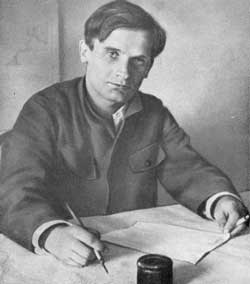
1st Writers Union Congress
(1934)
In his speech to the first Congress of Soviet Writers in August 1934, Yuri Olesha noted, "When you depict a negative hero, you yourself become negative." Perhaps because of this, Olesha took it personally when some critics damned the hero of his novel Envy as vulgar and worthless. Olesha also confessed that he does not understand the worker or revolutionary hero and cannot properly portray them in literature. Nonetheless, Olseha feels that there is much in his dreams that places him on the same level as a worker or Komsomol member, and that his presentation of Soviet youth is a worthy fulfillment of the writer's historic task as teacher and nurturer.
(Click here to read the entire text of Yuri Olesha's Speech to the First Writers Congress)
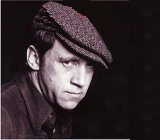 "Bard" Poetry & Prose
"Bard" Poetry & Proseby Vladimir Vysotsky
Vladimir Vysotsky, everyone's favorite bard, produced over 600 songs and fewer prose works. He was beloved by all strata of society-- taxi drivers, Party officials, and criminals. There is even a report that Cosmonauts took a Vysotsky tape along on one of their space journeys. Despite his immense popularity, not a single one of his songs was officially published in the Soviet Union during his life time. Some of his works did appear in "Metropol", an independent literary almanac which Vassily Aksyonov put together in 1979. But this highly unorthodox compilation was rejected immediately by the Writers Union and condemned as "pornography of the soul." Vysotsky himself jokingly referred to the project as "making conterfeit money."
Nowadays, of course, Vysotsky's work is available everywhere, including here at SovLit.net. We are pleased to begin our Vystosky offerings with: (1) a bilingual Russian-English edition of his song-poem, "Hey, Driver", in which the narrator attempts a nostalgic tour of his favorite Soviet prisons; and (2) a translation of "Rafts", a short prose work wherein Vysotsky rails against tugboat men and drunkenness. ("Hey, Driver") and ("Rafts")
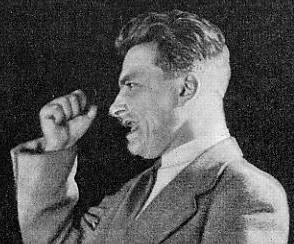 MAYAKOVSKY ON FUTURISM &
MAYAKOVSKY ON FUTURISM &THE LEF PROGRAM
In 1923 Mayakovsky then founded a movement and journal entitled LEF (The Left Front of Art). Three essays by Mayakovsky and his collaborators, appearing in the inaugural issue of the journal, laid out The LEF Program.
The lead essay, "What is LEF Fighting For?", traces the history of Futurism and describes its current tasks: to agitate the masses and to create a united Left Front of art for the destruction of the old culture. Proletarian writers are by in large dismissed as reactionaries regarding form. The experiments of Pilnyak and The Serapions are seen merely as weak attempts to adapt and dilute the devices of the Futurists.
The second essay, "Whom Does LEF Tear Into?", identifies LEF's enemies: those with the evil intention of an ideological restoration; those who preach a classless, universal art; and those who drag the metaphysics of prophecy and priesthood into art. Certain politicians are also told to keep their grubby hands out of art.
"Whom Does LEF Warn?" boasts that members of LEF are the "best workers in contemporary art". But it also warns Futurists, Constructivist, Productivists and others of complacency, cautioning that they cannot live off the interest of yesterday's revolutionality.
(Click here for "Mayakovsky on Futurism".) -- (Click here for "The LEF Program".)
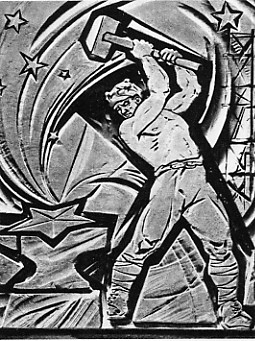 Uncivil Literary War:
Uncivil Literary War:In the mid-1920s, Moscow literary society was seething. The numerous separate literary organizations were engaged in heated battles with one another. Youthful fervor and revolutionary zeal were often combined with intolerance, abuse, and the merciless "working over" of literary opponents. Chief among the bully-boys was RAPP, the Russian Association of Proletarian Writers, which was keen on seizing literary hegemony for itself.
In the spring of 1925, rumors swirled that the Communist Party was on the verge of issuing a decree calling for a more tolerant and solicitious attitude toward "fellow-travelers", peasant-writers, and other literary groups. In a direct swipe at the RAPP, the decree was also to call for an end to Communist arrogance and the tone of command in literary criticism. Foreseeing an extended period of peaceful competition among literary trends and styles, the decree declared that literary hegemony was not to be bestowed upon any one particular group, but was to be earned.
Frightened by these rumors, the RAPP tried one last, desperate attempt to liquidate all rival literary organizations before the Party could act. In particular they were eager to get rid of their chief nemesis: The Smithy, headed by Fyodor Gladkov. Uncivil War: Fyodor Gladkov & The Smithy vs. RAPP is an account of a stormy meeting in which RAPP tried to manipulate The Smithy out of existence and of how Gladkov, Serafimovich, and other Smiths fought back.
In addition, SovLit.net also presents an English translation of the Party decree which provoked RAPP's underhanded attempt: On the Party's Policy in the Sphere of Artistic Literature, 1 July 1925.
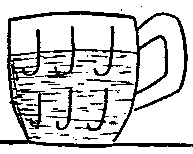
(letter to the militia)
by
Mikhail Zoshchenko
To misquote the narrator: "In line with official policy, we inform you that Honest Citizen is suspicious in terms of hilarity and you are required to read it immediately!"
(Click here to read the entire text of "Honest Citizen")
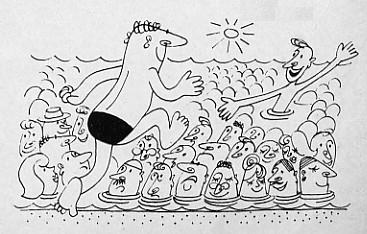 Conversation of a Rest Home Deputy Director with Guests on the Day of Their Arrival
Conversation of a Rest Home Deputy Director with Guests on the Day of Their Arrivalby Mikhail Zadornov
(c. 1983)
"Comrades! Our new, comfortable rest home was completed on the memorable 47th anniversary of the beginning of its construction!" Thus begins this humorous take-off on bureaucracy, sloth, shoddy construction, and the typical fun Soviet vacation experience. This piece forever dispells those unfounded rumors that Soviets are dour and humorless. Hey, if Leonid Brezhnev wasn't comfortable and spacious, I don't know who was!
(Click here for the full satire in English.)
 Remembering Gudok
Remembering Gudokby Mikhail Bulgakov
Excerpt from an unfinished manuscript by Mikhail Bulgakov (author of Master and Margarita) in which he recalls his work at the newspaper Gudok. He calls the work there "odious" and "a nightmare"; the sketches he wrote for the paper he describes as full of "stereotypes" and "coarseness".
(Click here to read entire article.)
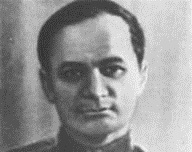 From the Notebooks of Andrei Platonov
From the Notebooks of Andrei PlatonovMaterial which Platonov himself wanted suppresssed,
liberated in 1973 by his widow and offered up for the world to read.
"...His genre is words that act...."
Short excerpt from an interview in which Fedin comments on the "invigoration" of Soviet literature and its renewed willingness to present the conflicts and ugliness of life.
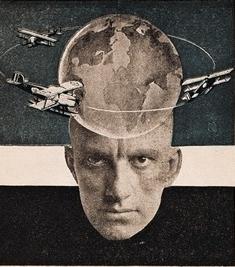
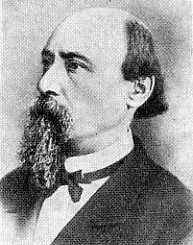 Mayakovsky and Nekrasov
Mayakovsky and Nekrasovby
Kornei Chukovsky
An extract from Kornei Chukovsky's 1952 work Nekrasov's Craftsmanship, providing an analysis of the thematic and stylistic similarities in the poetry of 19th-century civic poet Nikolai Nekrasov and Vladimir Mayakovsky.
(Click here to read entire article.)
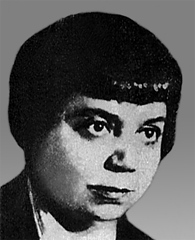
Lydia Seifullina recalls her first sighting of Mayakovsky.
 The Library of Siberian Novels
The Library of Siberian Novelsa 20-volume set, reviewed by
Boris Leonov
(Click here to read entire article.)
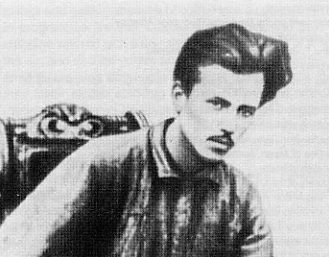 Remembering Ostrovsky
Remembering Ostrovskyby Anna Karavaeva
"Nikolai Ostrovsky and Pavel Korchagin are the closest of friends.
He's made from my brain and my blood, too, this Pavel person."
The editor who helped Ostrovsky prepare his proletarian masterpiece How the Steel Was Tempered recalls her first meeting with the writer, his struggle with illness, his fierce determination, love of life, and the great plans left unfulfilled by his death.
(Click here to read entire article.)
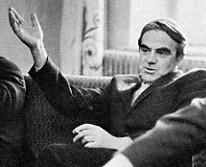 The Difference Betweem Soviet Literature and Western Literature (1971)
The Difference Betweem Soviet Literature and Western Literature (1971)by Daniil Granin
"Could I live in he West as a writer? The answer is no."
Comments by Daniil Granin (author of Those Who Seek) at a 1971 round-table discussion on the character of Soviet art. Granin discusses the balance Soviet writers strike between criticizing the drawbacks and affirming the values of Soviet society.
(Click here to read entire article.)
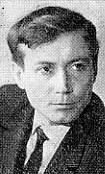 Young Soviet Writers About Themselves (1962)
Young Soviet Writers About Themselves (1962)Vasili AKSYONOV, Vasili BYKOV, Andrei VOZNESENSKY, Ivan DRATCH, Yevgeni YEVTUSHENKO, Yuri KAZAKOV, Justinas MARCINKEVICIUS, and Anatoli PRISTAVKIN respond to a questionnaire circulated in 1962 by the journal Voprosi Literaturi (Problems of Literature). They describe the traditions they respect in classical literature as well as the literary experiments they consider most promising. Their pre-writing life experiences and creative plans for the future are also revealed.
(Click here to read Young Soviet Writers About Themselves.)

by 1 Zoshchenko
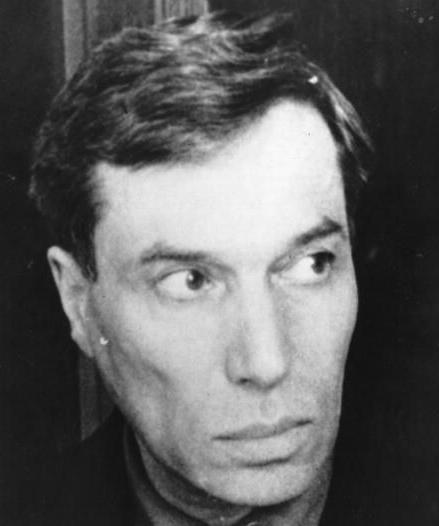 Boris Pasternak:
Boris Pasternak:On 23 October 1958, Boris Pasternak was awarded the Nobel Prize "for his important achievement both in contemporary lyrical poetry and in the field of the great Russia epic tradition."
Pasternak was pleased and proud to accept the award; others in Soviet society, however, did not see him as deserving of such an honor, calling him instead a traitor, philistine, and slanderer.
To read how this Nobel Prize was both accepted and rejected in telegrams, Click Here.
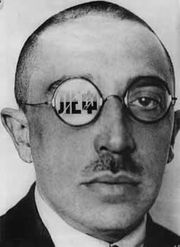
LEF AND MARXISM
The moderator of the debate, A.V. Lunacharsky, sided with LEF on the question of establishing a distinctly proletarian culture. But he warned the youth not to get carried away with LEF. For example, while he found a certain degree of artistic honesty in the work of Mayakovsky, Lunacharsky was dismayed by the extreme affectation of form, which, he contended, could lead one to think that there is no depth of feeling behind it.
A complete review of this debate was published in the fourth issue of LEF. To read this review, CLICK HERE.

by Nikolai Lyashko
CLICK HERE.
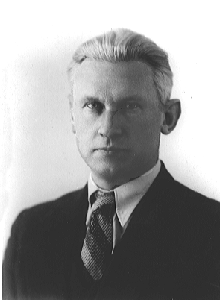
FADEEV KILLS SELF!
Blames "Ignoramuses"
KGB Calls Him a "Drunk"He left behind a note which was a blistering, insulting attack on the leadership of the Soviet government and the Soviet literary bureaucracy. In this, his final statement, Fadeev said things which, perhaps, could only be said by a dead man.
In its investigation of the matter, the KGB attributed the death simply to Fadeev's alcohol problem.
(Click here to read Fadeev's suicide note and two KGB reports on his death.)

Vladimir Vladimirovich Mayakovsky
Mayakovsky, Vladimir Vladimirovich.. Born 19 July (7 July, Old Style) 1893 in Bagdadi, Georgia (which was later named Mayakovsky in his honor). His father, Vladimir Konstantinovich, though of noble ancestry, was a forest ranger. The young Vladimir had two older sisters--Olga and Lyudmila. He began school in Kutais in 1902, but took little interest in studies. By the time he was in third grade, Mayakovsky found himself thrilled by the excitement of mass meetings, demonstrations, and revolutionary songs. Lyudmila, now a student in Moscow, would bring home legal and illegal political pamphlets.(Click here for full biography.)

Maksim Maksimovich Gorky
Pen-name of Aleksei Maksimovich Peshkov, born 28 March (16 March, Old Style) 1868 in Nizhny Novgorod, a city later to be renamed Gorky in his honor. His father, Maksim, had been born in Siberia, the son of a soldier, but had run away from his father's cruelty. In Nizhny Novgorod, Maksim learned the trades of carpentry, cabinet-making and upholstering. Aleksei's mother was the daughter of a former serf turned foreman of a dye shop.Early in his life, Gorky's family moved to Astrakhan, where he father worked as a shipping agent. His father died when the young Gorky was only five years old, and he was sent to live with his grandparents. At the age of eight, he quit school and was apprenticed to various tradesmen, including a shoemaker and an icon painter. When he was 12, Gorky left home and drifted from job to job. He worked as a dishwasher on a Volga steamer, where a cook taught him to read. In 1884, he moved to Kazan, dreaming of entering Kazan University, but was rejected. Gorky knew that he would have to make his own fortune in life. (Click here for full biography.)

Daniil Ivanovich Kharms
Real name, Daniil Ivanovich Iuvachev. Born 17 (30) December 1905 in Petersburg. His mother ran a refuge for women who were released from prison. His father was a member of the People's Will (Narodnaya Volya) revolutionary organization who turned religious and pacafist after being imprisoned in Siberia.In 1915, the young Daniil was sent to a very disciplined German school on the Nevsky Prospect. There he learned German and English. His notebooks contain hand-written copies of the poems of Lewis Carroll in English. In 1919, he went to live with his aunt in Detskoe Selo. He began to write verse in approximately 1922.
In 1924 he moved back to Leningrad and enters the Leningrad ElektroTeknicum. In 1925, he began to perform in public as a poetry reader of his own works as well as the works of other Soviet poets, including Mayakovsky, Severyanin, and Aseeva. He attended literary evenings and became friends with V. Vvedensky.
(Click here for full biography.)
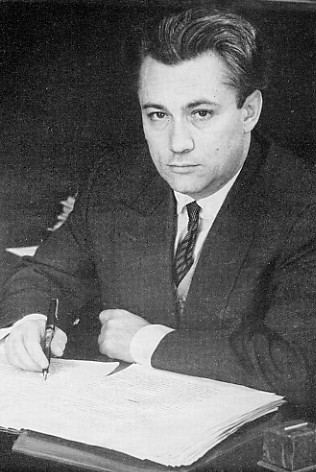
Yuri Markovich Nagibin
Born 3 April 1920 in Moscow. His parents divorced when he was eight years old, and he remained with his mother. Their address was 7 Armyansky Lane. At an early age, he demonstrated a talent for football, and a promising sports career was predicted for him. However, his step-father, a writer, noted an ability in the young Yuri to verbally convey his impressions easily and with humor. At his step-father's urging, Nagibin tried his hand at a story. The result was unsuccessful, but the boy found that he enjoyed the process of writing. A frequent visitor to the Nagibin household was writer Andrei Platonov. Nagibin was later to admit that for a long time he tried to imitate Platonov's style. After graduation from school, Nagibin, in accordance with his mother's wishes, undertook the study of medicine. However, he lasted at the medical institute for only one semester. He transferred a film school screenwriting section. During this time, he began writing seriously. He first published story was Dvoinaya Oshibka ("Double Mistake"), which appeard in Ogonyok in March 1940. (Click here for full biography.)More Biographies of Soviet Writers:
The website formerly known as SovLit.com lost its domain name through the arrogance and negligence of the editors. They have been sacked.
But don't worry, they have all been rehired and are diligently working to restore the site under the new domain of SovLit.net. It will be a long, tedious process before our former glory is fully rehabilitated, so your patience is requested.
Fortunately for you, volunteer opportunities abound. We are seeking readers, proofers, translators, and -- particularly now--those with HTML Programming Skills. Interested parties can contact us at: editor@sovlit.net.
Thank you,
The Editors
(formerly, "The Editors")


 a Soviet Literature resource
a Soviet Literature resource
